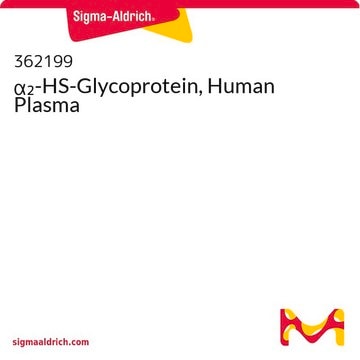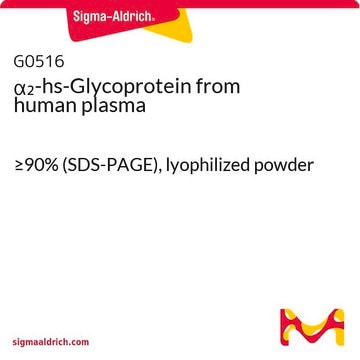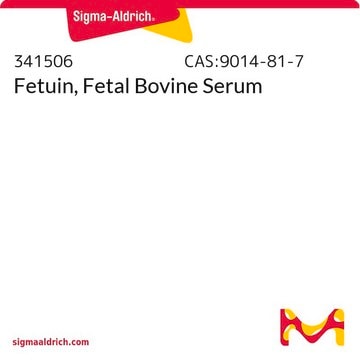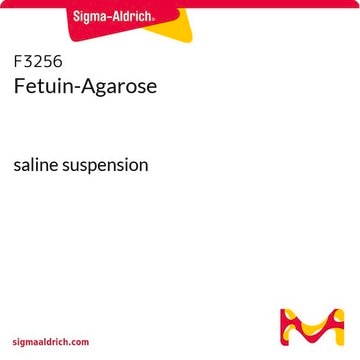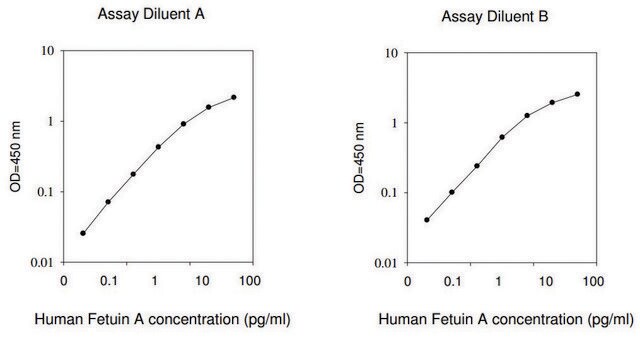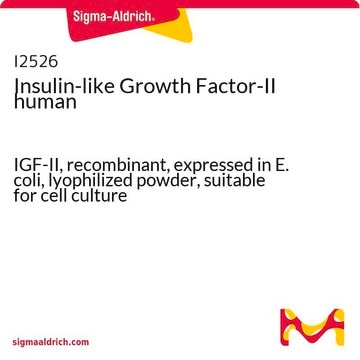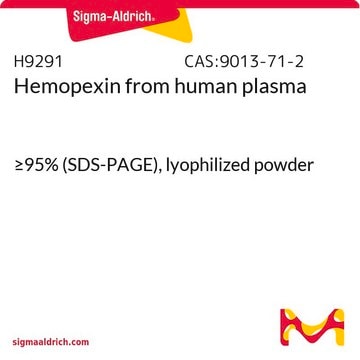SRP3283
FETUIN A human
recombinant, expressed in HEK 293 cells, ≥95% (SDS-PAGE), ≥95% (HPLC)
Synonym(s):
Alpha-2-HS-glycoprotein
Sign Into View Organizational & Contract Pricing
All Photos(1)
About This Item
Recommended Products
biological source
human
recombinant
expressed in HEK 293 cells
Assay
≥95% (HPLC)
≥95% (SDS-PAGE)
form
lyophilized
potency
≥100 nM
mol wt
45.0-55.0 kDa
packaging
pkg of 50 μg
impurities
<0.1 EU/μg endotoxin, tested
color
white to off-white
UniProt accession no.
shipped in
wet ice
storage temp.
−20°C
Gene Information
human ... AHSG(197)
Related Categories
General description
The gene AHSG (α-2-HS-glycoprotein, also referred to as fetuin-A) is mapped to human chromosome 3q27. Fetuin A/AHSG is a human plasma glycoprotein belonging to the Cystatin family of proteases inhibitors. Fetuin A is highly expressed in embryonic cells and adult hepatocytes, and is expressed to a lesser extent in monocytes/macrophages. The protein has cystatin-like domains, a calcium phosphate-binding site and a TGF (transforming growth factor)-β cytokine-binding motif. Recombinant human fetuin-A is a heterodimeric protein containing a 282 amino acid A chain and a 27 amino acid B chain. Due to glycosylation, recombinant fetuin-A migrates at an apparent molecular weight of 45–55kDa by SDS-PAGE run under nonreducing conditions.
Application
FETUIN A human has been used to stimulate mRNA expression in human monocytic THP1 cells, human in vitro differentiated adipocytes and C57BL/6 mice.
Biochem/physiol Actions
AHSG (α-2-HS-glycoprotein, also referred to as fetuin-A) is a major serum protein component that exerts various calcium dependent physiological activities, and can mediate growth signaling in certain tumor cells. It also can act as a natural antagonist against specific TGF-β (transforming growth factor β) and BMP (bone morphogenetic protein) signaling proteins. High levels of fetuin-A in the serum is associated with mild osteogenesis imperfecta. On the other hand, reduced levels are seen in Paget′s disease. It is predicted as a potential biomarker for the early diagnosis of hypopharyngeal squamous cell carcinoma.
Physical form
Lyophilized from 10 mM Sodium Phosphate, pH 7.8.
Reconstitution
Centrifuge the vial prior to opening. Reconstitute in water to a concentration of 0.1-1.0 mg/mL. Do not vortex. This solution can be stored at 2-8°C for up to 1 week. For extended storage, it is recommended to further dilute in a buffer containing a carrier protein (example 0.1% BSA) and store in working aliquots at -20°C to -80°C.
Storage Class Code
12 - Non Combustible Liquids
WGK
WGK 1
Flash Point(F)
Not applicable
Flash Point(C)
Not applicable
Choose from one of the most recent versions:
Certificates of Analysis (COA)
Lot/Batch Number
Don't see the Right Version?
If you require a particular version, you can look up a specific certificate by the Lot or Batch number.
Already Own This Product?
Find documentation for the products that you have recently purchased in the Document Library.
Customers Also Viewed
Fetuin-A induces cytokine expression and suppresses adiponectin production
Hennige AM, et al.
PLoS ONE, 3(3) (2008)
Human fetuin/alpha2HS-glycoprotein level as a novel indicator of liver cell function and short-term mortality in patients with liver cirrhosis and liver cancer.
Kalabay L
European Journal of Gastroenterology & Hepatology, 14, 389-394 (2002)
Proteomic identification of alpha-2-HS-glycoprotein as a plasma biomarker of hypopharyngeal squamous cell carcinoma.
Tian WD
International Journal of Clinical and Experimental Pathology, 8, 9021-9031 (2015)
Association of alpha2-HS glycoprotein (AHSG, fetuin-A) polymorphism with AHSG and phosphate serum levels.
Osawa M
Human Genetics, 116, 146-151 (2005)
alpha 2-HS glycoprotein/fetuin, a transforming growth factor-beta/bone morphogenetic protein antagonist, regulates postnatal bone growth and remodeling.
Szweras M
The Journal of Biological Chemistry, 277, 19991-19997 (2002)
Our team of scientists has experience in all areas of research including Life Science, Material Science, Chemical Synthesis, Chromatography, Analytical and many others.
Contact Technical Service


